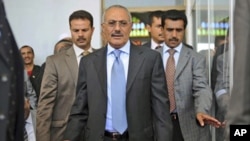After a month of protests across Yemen, President Ali Abdullah Saleh has pledged to draft a new constitution, which he says will be voted on by the nation before the end of the year. An opposition spokesperson says the move is too little, too late.
The Yemeni president announced his plan in a nationally televised speech in the capital Sana’a.
He said a committee will be formed to prepare the new constitution, which he said will be based on the separation of powers.
He said a referendum on the new constitution will be held before the end of 2011.
It is the latest in a string of concessions made by Saleh in an attempt to quell protests in his country.
Yemen is a presidential republic and Saleh, who has been in power since a military coup in 1978, wields considerable power.
But the country is suffering: water wells are drying out, oil resources are diminishing, unemployment is soaring and the population is growing – almost half the nation is under the age of 15.
Since a revolt in Egypt toppled longtime leader Hosni Mubarak last month, people in Yemen have taken to the streets hoping to oust Saleh in the same way.
After the leader's speech on Thursday, an opposition spokesperson said the president’s pledge to draw up a constitution was too little, too late.
In London, a spokesman for Human Rights Watch, Tom Porteous, says the move by Saleh, if genuine, is a positive step. But he says the facts on the ground undermine the president's pledges for political reform.
"The problem we have in Yemen is that at the same time as offering political reform, which is a part of what the protesters are asking for, the government continues to crack down very hard on the protesters and we get deaths and injuries, and that's not a productive way to go about reform," Porteous said.
According to information collected by Amnesty International, about 30 people have been killed since protests began.
Human Rights Watch on Thursday reported that two people were killed during demonstrations in northern Yemen this month. Based on interviews with witnesses and medical staff, the group says soldiers fired on demonstrators who were protesting peacefully in the town of Harf Sufyan on March 4.
Clashes have taken place repeatedly in the north in recent years between security forces and a Shi'ite rebel movement. Yemen’s Defense Ministry blamed the March 4 incident on the rebels, who it said, attacked a military post.
Porteous says security forces have been cracking down on protesters throughout Yemen.
“We've been documenting violence used by the security forces in Sana’a, where there have been demonstrations; also in the south where there have been protests, which are related in part to the secessionist movement there and organized by the secessionist movement but have become part of the nationwide protests against the president, and now this incident in the north,” Porteous added.
Saleh is a longtime ally of the United States. He says he will not step down until 2013 when his term is due to end.




